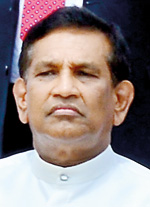News
Why no goals for vital health sectors, asks Rajitha
As the United Nations General Assembly focuses on Sustainable Development Goals (SDGs) in New York next week, Sri Lanka raised several concerns at a high-level regional health meeting in early September as to why certain important indicators had not been identified in the health-related SDG.

Dr. Rajitha Senaratne
Why have no indicators been identified to monitor malnutrition, immunisation status, coverage of water and sanitation, the incidence of dengue in view of elimination as it is one of the major public health issues in the region and chronic kidney disease with special emphasis on kidney disease of unknown origin which is a major health issue in Sri Lanka, queried Health Minister Dr. Rajitha Senaratne at the 68th Regional Committee Meeting of the World Health Organisation’s South-East Asia Region (SEAR) in Dili, Timor-Leste.
It was as the moderator of the Ministerial Round-table on ‘Health in the post-2015 Development Agenda’ on September 9 that Dr. Senaratne said: “I strongly believe that these should be included in the monitoring framework under the health-related SDG.”
While discussing whether the issues faced by SEAR’s 11 member-states are reflected in the SDG for health and also focusing on the challenges the countries would face in implementing them, that he sought answers to: Does the SDG for health and its 13 targets reflect well the critical health challenges in SEAR member-states today and in the medium term; what opportunities and challenges are likely in making progress on the SDG on health; what mix of finances for health (government, private, external) is likely to be mobilised in the coming years in member-states; and how can progress be monitored?
SEAR comprises Sri Lanka, India, Bangladesh, Bhutan, Nepal, Maldives, Thailand, Myanmar, Democratic People’s Republic of Korea, Indonesia and Timor-Leste. SEAR is headed by Regional Director Dr. Poonam Khetrapal Singh and the Regional Committee is the governing body which sets the health agenda for the region annually.
The delegation from Sri Lanka comprised Health Minister Dr. Rajitha Senaratne, Advisor Dr. Sujatha Senaratne, Health Services Director-General (DG) Dr. Palitha Mahipala and Deputy DG (Planning) Dr. Neelamani Rajapaska Hewageegana.
During this important roundtable, after Dr. Senaratne invited views by the Democratic People’s Republic of Korea, Bangladesh and Thailand, he “changed hats” from moderator to panellist and said that Sri Lanka has made significant progress towards achieving a majority of the health-related Millennium Development Goals (MDGs). The SDGs built on the MDGs will chart what developmental direction the world should take post-2015 up to 2030.
Explaining that Sri Lanka has reduced the number of underweight children under five years and also child and maternal mortality, combated diseases like malaria, which is in the pre-elimination phase and reached the target of halving the proportion of people without sustainable access to safe drinking water and basic sanitation, the Minister, however, said that “we are yet to meet the targets of reversing the spread of tuberculosis, leprosy and HIV/AIDs and reaching the targets of infant mortality”.
He went on to say that looking beyond the national level, Sri Lanka recognises the need for much sustainable effort to reach all levels in the country to eliminate district-level disparities. “We recognise the need for stronger governance structures to bring in greater accountability for health outcomes much more than ever before. While the global discussion on SDGs was taking place, we have been constructing a National Health Performance Framework capturing most of the health-related SDGs. These will reflect our health status, health determinants that go beyond the health sector and equity issues.
Pointing out that this will give Sri Lanka the experience on how multi-sectoral engagement should be solicited, Dr. Senaratne said that this work may be useful for the region. The development of the next Health Master Plan from 2017 onwards for Sri Lanka will strongly focus on achieving universal health coverage reflecting also the targets of the SDGs.
Earlier, on September 7, the Minister was ‘Lead Speaker’ at the Ministerial Round-table on ‘Accelerating the implementation of the WHO Framework Convention on Tobacco Control (FCTC)’, a comprehensive piece on which was published in the Sunday Times of September 13 and on September 8, a panellist on ‘Strengthening the health workforce in Southeast Asia to expand delivery of effective services’.
With regard to the strengthening of the health force, he said a transformation in medical education is being considered to develop appropriate competencies to strengthen management at primary care. The envisaged change at primary level health care includes the concept of “primary care doctor for all” with greater accountability for health outcomes through preventive and curative care, a personal health record for all adults and competencies for family-centred and more personalised care.
It would be more inclusive of vulnerable communities such as migrant workers and also the remote and relatively underserved communities, the Minister said, adding that Sri Lanka also recognises the need for more Government financing for health care and is committed towards Universal Health Coverage.
SEAR’s Key concerns and resolutions  Dr. Khetrapal Singh briefing the media during the Regional Committee meeting. Pic by Nivell Rayda The key concerns of SEAR resulted in the adoption of six resolutions: “Common infections and minor injuries which have been treatable for decades may once again kill millions. Resistance to antibiotics will make complex surgeries and management of several chronic illnesses like cancer, extremely difficult,” she said, stressing that antibiotics are “a precious resource”. According to Dr. Khetrapal Singh the current global AMR has resulted from injudicious rampant use of antibiotics by prescribers, patients not completing full treatment courses, over-use of antibiotics in livestock and fish farming, poor control of infections in health-care settings and poor hygiene. There are not many new antibiotics in the pipeline that can replace the resistant and ineffective ones. The projected statistics are an eye-opener — 10 million deaths per year globally and 2 to 3.5% less global gross domestic product by 2050 if AMR goes unchecked. Cancer prevention and control – The member-states resolved to implement multi-sectoral actions for primary prevention of cancer risk factors, in particular tobacco, alcohol, unhealthy diet, physical inactivity, infections causing cancers, behavioural risk factors, exposure to environmental risk factors while increasing public awareness to reduce modifiable risk factors and strengthening community based interventions. With 1.1 million deaths and 1.7 million new cancer cases every year in SEAR, Dr. Khetrapal Singh explained the need to ensure comprehensive cancer services to the community including promotion, prevention of modifiable risk factors, early detection and treatment, and availability of affordable diagnostics, medical products and palliative care. “Many cancers are preventable, can be detected early and treated to improve survival rates and the quality of life of the affected persons,” she said. Tobacco control — The Dili Declaration adopted by the member-states was endorsed in this resolution which highlighted the urgency for stronger measures to stop the tobacco epidemic in the regiono Preparedness to respond to emergencies and outbreaks – This resolution called for the implementation of health goals and targets of the Sendai Framework for Disaster Risk Reduction (2015-2030) and the International Health Regulation (2005) through multi-sectoral, multi-stakeholder and all-of-society engagement and partnership. Dr. Khetrapal Singh said that taking a lesson from the 2004 tsunami, the WHO has set up 12 benchmarks to measure comprehensive capacities in emergency preparedness and response, while working closely with member-states to strengthen them. The South-East Asia Regional Health Emergency Fund (SEARHEF) which can be disbursed within a day and other emergency capacities built in the region after the tsunami have been invaluable in situations such as the terrible earthquake in Nepal this year. Community-based health services — The member-states resolved to strengthen and diversify health workers’ capacities. This is to enable them to respond to the changing health needs of communities, addressing social determinants of health, in particular awareness and detection of non-communicable diseases, care for elderly and persons with disabilities, rehabilitation and palliative care, disease surveillance and emergencies and disasters. Patient safety for sustainable Universal Health Coverage (UHC) – This endorsed the Regional Strategy on Patient Safety to build safer health care facilities, create and sustain a culture of safety at all levels of health care; enhance awareness and engage patients and communities in the process of improved patient safety, to strengthen health systems and support UHC. | |

